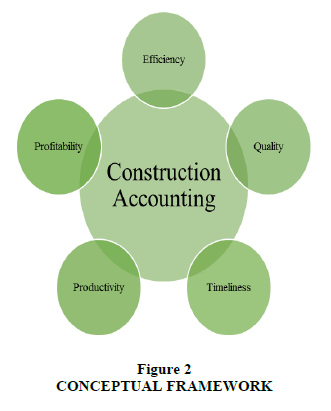Why Construction Accounting is Essential for Efficient Project Management
Why Construction Accounting is Essential for Efficient Project Management
Blog Article
Recognizing the Value of Building Accounting for Effective Task Administration

Role of Building Audit
Construction accountancy works as the backbone of monetary monitoring in the construction market, guaranteeing that jobs are finished within spending plan and monetary objectives are satisfied. construction accounting. This customized accounting strategy addresses the special challenges dealt with in building jobs, including differing task periods, fluctuating prices, and several stakeholders
Among the key functions of building and construction audit is to supply exact expense evaluation and monitoring throughout the job lifecycle. This assists in enlightened decision-making, making it possible for task supervisors to change resources and timelines properly. In addition, building accountancy improves capital management by monitoring accounts payable and receivable, hence making certain that funds are readily available for timely payments to subcontractors and distributors.
Additionally, construction accounting aids in conformity with industry guidelines and coverage needs. It outfits task supervisors with the essential financial data to prepare in-depth economic statements, which are crucial for audits and financial evaluations. By maintaining clear documents, construction accounting promotes openness and responsibility, vital parts in developing trust amongst stakeholders. Eventually, the role of building and construction accounting expands beyond mere financial tracking; it is indispensable to calculated planning and functional efficiency, driving the success of building and construction tasks in a competitive landscape.
Secret Parts of Construction Bookkeeping

Budgeting develops an economic framework that overviews task implementation, permitting supervisors to allot resources effectively and prepare for prospective monetary obstacles. Precise expense tracking is essential for monitoring costs in real-time, aiding to identify variations in between projected and actual prices. This makes it possible for timely changes to keep the project on spending plan.
Furthermore, monetary coverage supplies stakeholders with a clear photo of the project's economic health and wellness. Routine records, such as earnings and loss statements and money flow analyses, help with informed decision-making and enhance openness amongst all parties entailed.
In addition, conformity with sector policies and audit requirements is important. This ensures that monetary practices are not just efficient however additionally legal, safeguarding the company versus lawful consequences. By integrating these key elements, construction accountancy promotes an organized method to taking care of funds, ultimately adding to the successful conclusion of building jobs.
Benefits for Job Supervisors
Leveraging effective building and construction accounting methods supplies job managers with a wide variety of advantages that enhance both operational efficiency and economic oversight. One substantial advantage is improved budget plan monitoring. Exact tracking of expenditures and earnings enables project managers to check economic efficiency in actual time, making certain tasks continue to be within spending plan and facilitating timely modifications when needed.
Additionally, construction accounting enhances capital administration, allowing project supervisors to prepare for financial demands and maximize source allocation. By recognizing cash inflows and outflows, they can better handle repayments to subcontractors, employees, and distributors, thus staying clear of costly delays.
Furthermore, durable audit systems offer extensive coverage capabilities. Job supervisors can create reports that use insights into task productivity, cost differences, and resource utilization. This data-driven method fosters notified decision-making, allowing supervisors to identify possible concerns proactively and carry out rehabilitative steps.
Lastly, adherence to building accounting standards guarantees compliance with regulative and legal requirements, lessening the danger of pop over to this web-site charges or conflicts. Continue Overall, efficient building accounting furnishes project supervisors with the tools essential to drive project success, boost stakeholder self-confidence, and promote long-term business growth.
Common Obstacles in Construction Bookkeeping
Lots of project managers encounter significant obstacles in building and construction bookkeeping that can hinder project success. Among the key obstacles is the complexity of tracking numerous task sites, each with unique budgets, timelines, and resource allocations. This requires thorough attention to detail, which can be frustrating without a durable accountancy system in location.
Additionally, changing product costs and labor prices can make complex budget monitoring, making accurate projecting difficult. Project supervisors typically have a hard time to integrate these prices with real expenses, bring about possible economic discrepancies.
Moreover, building and construction bookkeeping involves compliance with different laws, consisting of tax obligations and labor legislations. Browsing these rules can be daunting, particularly for managers that may not have a solid audit history.
An additional significant difficulty is taking care of money circulation, which is vital in the building and construction industry. Delays in invoicing, repayments from clients, or unanticipated project modifications can develop cash flow lacks, jeopardizing the job's development.
Last but not least, effective communication in between task supervisors, accountants, and area groups is crucial. Misconceptions can result in inaccurate economic coverage, better making complex project monitoring efforts. Dealing with these obstacles proactively is necessary for successful building accounting.

Finest Practices for Effective Accountancy
While navigating the complexities of building and construction bookkeeping can be complicated, taking on best practices can substantially boost monetary administration and project success. One essential technique is maintaining timely and accurate records. Carrying out durable accountancy software program customized to building tasks can simplify information entry, invoicing, and reporting, saving and decreasing mistakes time.
Additionally, establishing a clear budget plan and normal surveillance versus this budget plan are essential. Utilizing a system of periodic financial testimonials allows job managers to identify differences early, facilitating prompt decision-making. It is additionally vital to separate project expenses right into straight and indirect groups, allowing clearer understandings into profitability.
An additional finest practice includes promoting open communication among all stakeholders. Normal updates and collective conversations regarding financial standing can ensure everybody is lined up and notified. Training personnel in construction-specific bookkeeping principles further enhances proficiency and accuracy.
Finally, making certain compliance with pertinent accountancy requirements and regulations is non-negotiable. Regular audits and interior reviews add to openness and accountability, developing count on with stakeholders and customers. By focusing on these best methods, building firms can enhance their accountancy processes, ultimately driving project success and economic stability.
Conclusion
In verdict, construction bookkeeping plays a critical duty in guaranteeing successful job management by facilitating accurate monetary oversight and boosting decision-making. By integrating essential parts such as price evaluation, money circulation administration, and compliance, project supervisors can navigate typical difficulties and utilize finest techniques for effective audit. Eventually, a robust construction accounting framework not just safeguards spending plan honesty however also adds to the overall monetary wellness of construction projects, fostering lasting success within the sector.
By incorporating these key components, building accounting promotes an organized strategy to taking care of economic resources, eventually adding to the effective completion of building and construction projects.
Precise tracking of expenditures and profits allows task managers to monitor monetary performance in genuine time, ensuring projects stay within spending plan and assisting in timely adjustments when Click This Link essential.
Project managers can produce records that use insights into project productivity, cost variances, and resource usage.Numerous job supervisors experience considerable difficulties in building accounting that can impede job success. construction accounting. Ultimately, a durable building accounting structure not just safeguards budget plan stability yet likewise contributes to the total monetary health and wellness of building projects, cultivating lasting success within the market
Report this page